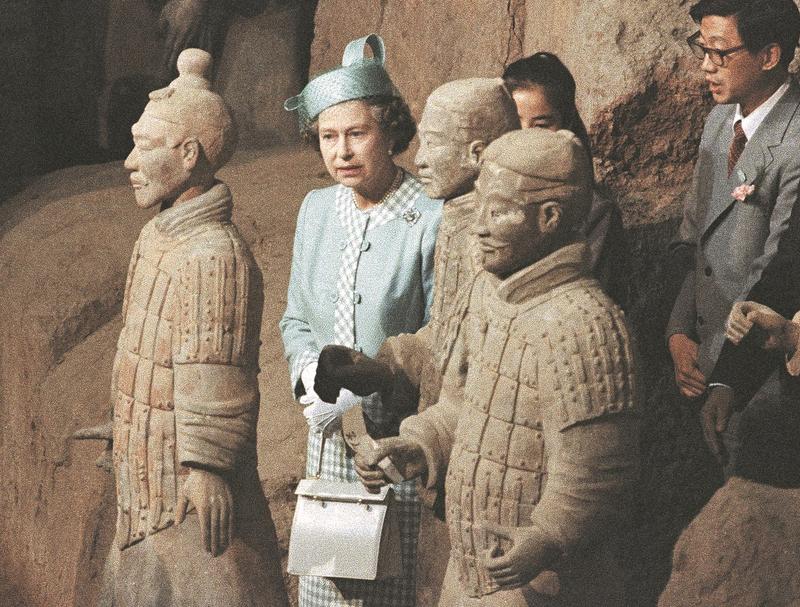 Queen Elizabeth II visits the Terracotta Warriors Museum in Xi'an, Shaanxi province, on Oct 16, 1986. (PHOTO / AP)
Queen Elizabeth II visits the Terracotta Warriors Museum in Xi'an, Shaanxi province, on Oct 16, 1986. (PHOTO / AP)
President Xi Jinping sent a message of condolence on Friday to Britain's new King Charles III on the passing away of Queen Elizabeth II at the age of 96 at Balmoral Castle in Scotland on Thursday.
On behalf of the Chinese government and the Chinese people and in his own name, Xi mourned the loss of Queen Elizabeth II and expressed sincere condolences to the British Royal Family, government and people.
In his message, Xi said that Queen Elizabeth II had won wide acclaim as Britain's longest-reigning monarch.
Queen Elizabeth II was the first British monarch to visit China, and her demise is a great loss to the British people, Xi added.
Xi stressed that he attaches great importance to the development of Sino-UK relations.
President Xi Jinping said he is willing to work with King Charles III to take the 50th anniversary of the establishment of bilateral diplomatic ties at the ambassadorial level as an opportunity to promote the sound and stable development of bilateral relations, further benefiting the two countries and their peoples
The president said he is willing to work with King Charles III to take the 50th anniversary of the establishment of bilateral diplomatic ties at the ambassadorial level as an opportunity to promote the sound and stable development of bilateral relations, further benefiting the two countries and their peoples.
Also on Friday, Premier Li Keqiang sent a message of condolence to British Prime Minister Liz Truss, mourning the passing of Queen Elizabeth II and expressing condolences to the queen's family members and the British government.
Queen Elizabeth II, whose death at Balmoral in Scotland was announced by Buckingham Palace on Thursday, was born in the era of silent movies, and lived to see the era of virtual reality and artificial intelligence.
She arrived in a world in which her grandfather King George V was the emperor of India, and left it with Britain still finding its feet on the world stage following its exit from the European Union.
As the first British monarch to visit China, Queen Elizabeth II witnessed and supported the advancement of friendly Sino-UK ties since her visit in 1986.
In her most recent interaction with President Xi in 2015, she described Xi's visit to the United Kingdom as "a milestone in this unprecedented year of cooperation and friendship" and the two countries' relationship as "truly a global partnership".
"We have much reason to celebrate the dynamic, growing economic relationship between our countries as well as our success in working together to address pressing international challenges," she said in her speech, adding that global challenges, such as terrorism, poverty and climate change, call for collaboration between the nations.
"This global partnership is supported by an expanding network of links between the people of our two countries … while we welcome the increasing numbers of Chinese tourists, students and business visitors to the United Kingdom," said the queen, who then recalled her first and only visit to China in 1986.
ALSO READ: Xi sends condolences to King Charles III over queen's passing
The queen had a packed schedule as she visited Beijing, Shanghai, Xi'an, Shaanxi province, Kunming, Yunnan province, and Guangzhou, Guangdong province. During her visit, she had the opportunity to see the Great Wall, the Forbidden City and the Terracotta Warriors.
The queen said these were all unforgettable memories of China's ancient civilization, "Yet it was China's desire to shape a new future which captivated us the most. We were struck by the energy and enthusiasm with which China's leaders were forging ahead with a new and ambitious future for the Chinese people."
Two years prior to her China visit, the governments of China and the UK reached an agreement on Hong Kong's return to the motherland under the principle of "one country, two systems".
During her visit in 1986, the queen praised the conscientious efforts of both sides during the previous two years which were dedicated to the full and smooth implementation of the joint declaration.
In 1999, two years after Hong Kong's return to the motherland, then Chinese president Jiang Zemin visited the queen at Buckingham Palace. The queen said she thought highly of the smooth transition of sovereignty of Hong Kong, as well as China's policies and Chinese culture.
In 2005, one year after China and the UK established a comprehensive strategic partnership, the queen invited then Chinese president Hu Jintao for a state visit, during which the Chinese and UK governments and businesses from both nations signed an array of agreements on cooperation.
READ MORE: Britain's King Charles to address a nation in mourning
Kong Yuan, a researcher at the Institute of European Studies at the Chinese Academy of Social Sciences, said that Queen Elizabeth II played a very important role in maintaining the national honor and pride of Britain.
"Her death will be an emotional blow for many British people, especially when the country stands on the brink of a deep economic crisis and with many foreign policy challenges to manage," Kong said.
Just two days before she passed away, Queen Elizabeth II formally appointed Liz Truss as Britain's prime minister at the queen's Balmoral estate in Scotland on Tuesday.
Kong said although Truss made some confrontational remarks about China during the contest for the leadership of Britain's ruling Conservative Party, there's no reason for her to make Sino-UK relations confrontational.
"The latest figures show that China is Britain's third-largest trading partner, so pragmatic cooperation will continue to be in the interests of both sides," he said, adding that China and the UK have great potential for cooperation in many sectors, such as financial services, education, healthcare and climate change.


